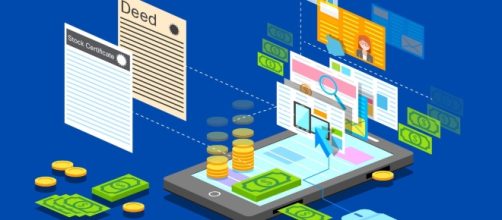If there is something that is currently taking the FinTech industry by storm, it has to be the Blockchain technology. After all it is turning ever distasteful record-keeping into something really attractive. A recent resolution submitted to the US house calls for a policy on digital currenciesand, of course Block-chain technology. We can safely say that it has what it takes to be labelled as ‘the biggest breakthrough since the arrival of the internet.
What is Blockchain?
To be over-simplistic it is the technology underpinning digital currency Bitcoins- a public ledger of allBitcoin transactionsever made.
Some or all of the recent transactions are verified and recorded on a ‘block’ (current part of blockchain). Once completed, this block goes to blockchain as a permanent database and a new block gets generated to record the transactions. The countless number of such blocks that get produced every 10 minutes are linked to each other (like a chain) in proper linear, chronological order with every block containing a hash of the previous block. Blockchain has complete information about the addresses and their balances at present, and at all the moments in the past.
That’s not all. The transactions are not only secure and hack-immune, but also cut out any third party involvement for peer-to-peer transactions.
Each and every transaction is stored as non-editable cryptographedentity, ensuring not only transparency, but speed, accuracy and a complete irrelevance for any paper transaction.
Block chain is the next big thing
Some developers have begun looking at the creation of other blockchains as they believe depending on a single blockchain is not a good idea. Parallel blockchains, sidechains or completely independent blockchains, call for throwing in more and more innovation. It is estimated that $1 billion has been invested in blockchain start-ups since the technology was introduced. With big fish like IBM investing in start-ups building blockchain based services, it is necessitated to hike even further.
The far reaching effects of block-chain
It has started off by revolutionizing the finance industry. Banks including J.P Morgan Chase and Citigroup have successfully tested it on credit-default swaps and Governments have starting drafting policies recognizing its intensity and strength. However it is not just financial. Non financial industries, from conventional supply chain management to basic administrative tasks, are plunging into it in anticipation of enormous profits. So in near future expect blockchain to record your kids’ grades and academic certificates as well as paying your tax by it.
Blockchain sounds like sci-fi
That’s what it may sound like but let me take you into the world of what blockchain can do.
A smart contract, that executes every little detail documented, not allowing even a slightest breach. A diamond database, which registers millions of diamonds with real-time tracking, past and present values, and even the names and addresses it changed hands from. If this diamond is stolen or smuggled, it takes the police a mere few seconds to track it down and catch the culprits. Such an audit trial can be extended to organic food produce, where you determine where it was grown, its certifying authority as well as the amount of money that the farmer received when you purchased his product.
So while new entrepreneurs work their sleep off bringing blockchain to your platter, enjoy the transaction to a new and changed world of blockchains, something like, the world before internet and the world after it.

